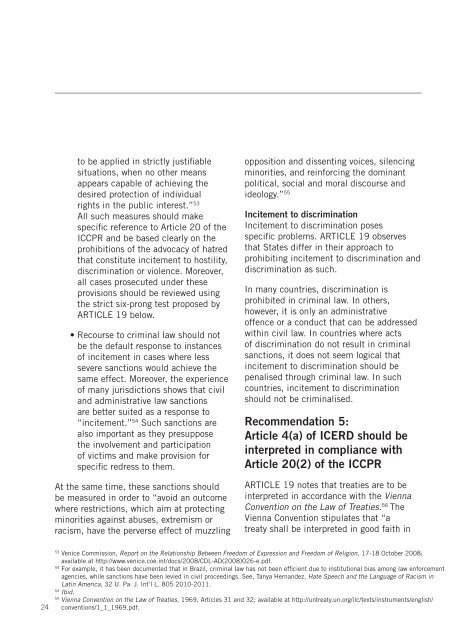ARTICLE-19-policy-on-prohibition-to-incitement
ARTICLE-19-policy-on-prohibition-to-incitement
ARTICLE-19-policy-on-prohibition-to-incitement
You also want an ePaper? Increase the reach of your titles
YUMPU automatically turns print PDFs into web optimized ePapers that Google loves.
<strong>to</strong> be applied in strictly justifiable<br />
situati<strong>on</strong>s, when no other means<br />
appears capable of achieving the<br />
desired protecti<strong>on</strong> of individual<br />
rights in the public interest.” 53<br />
All such measures should make<br />
specific reference <strong>to</strong> Article 20 of the<br />
ICCPR and be based clearly <strong>on</strong> the<br />
prohibiti<strong>on</strong>s of the advocacy of hatred<br />
that c<strong>on</strong>stitute <strong>incitement</strong> <strong>to</strong> hostility,<br />
discriminati<strong>on</strong> or violence. Moreover,<br />
all cases prosecuted under these<br />
provisi<strong>on</strong>s should be reviewed using<br />
the strict six-pr<strong>on</strong>g test proposed by<br />
<str<strong>on</strong>g>ARTICLE</str<strong>on</strong>g> <str<strong>on</strong>g>19</str<strong>on</strong>g> below.<br />
• Recourse <strong>to</strong> criminal law should not<br />
be the default resp<strong>on</strong>se <strong>to</strong> instances<br />
of <strong>incitement</strong> in cases where less<br />
severe sancti<strong>on</strong>s would achieve the<br />
same effect. Moreover, the experience<br />
of many jurisdicti<strong>on</strong>s shows that civil<br />
and administrative law sancti<strong>on</strong>s<br />
are better suited as a resp<strong>on</strong>se <strong>to</strong><br />
“<strong>incitement</strong>.” 54 Such sancti<strong>on</strong>s are<br />
also important as they presuppose<br />
the involvement and participati<strong>on</strong><br />
of victims and make provisi<strong>on</strong> for<br />
specific redress <strong>to</strong> them.<br />
At the same time, these sancti<strong>on</strong>s should<br />
be measured in order <strong>to</strong> “avoid an outcome<br />
where restricti<strong>on</strong>s, which aim at protecting<br />
minorities against abuses, extremism or<br />
racism, have the perverse effect of muzzling<br />
oppositi<strong>on</strong> and dissenting voices, silencing<br />
minorities, and reinforcing the dominant<br />
political, social and moral discourse and<br />
ideology.” 55<br />
Incitement <strong>to</strong> discriminati<strong>on</strong><br />
Incitement <strong>to</strong> discriminati<strong>on</strong> poses<br />
specific problems. <str<strong>on</strong>g>ARTICLE</str<strong>on</strong>g> <str<strong>on</strong>g>19</str<strong>on</strong>g> observes<br />
that States differ in their approach <strong>to</strong><br />
prohibiting <strong>incitement</strong> <strong>to</strong> discriminati<strong>on</strong> and<br />
discriminati<strong>on</strong> as such.<br />
In many countries, discriminati<strong>on</strong> is<br />
prohibited in criminal law. In others,<br />
however, it is <strong>on</strong>ly an administrative<br />
offence or a c<strong>on</strong>duct that can be addressed<br />
within civil law. In countries where acts<br />
of discriminati<strong>on</strong> do not result in criminal<br />
sancti<strong>on</strong>s, it does not seem logical that<br />
<strong>incitement</strong> <strong>to</strong> discriminati<strong>on</strong> should be<br />
penalised through criminal law. In such<br />
countries, <strong>incitement</strong> <strong>to</strong> discriminati<strong>on</strong><br />
should not be criminalised.<br />
Recommendati<strong>on</strong> 5:<br />
Article 4(a) of ICERD should be<br />
interpreted in compliance with<br />
Article 20(2) of the ICCPR<br />
<str<strong>on</strong>g>ARTICLE</str<strong>on</strong>g> <str<strong>on</strong>g>19</str<strong>on</strong>g> notes that treaties are <strong>to</strong> be<br />
interpreted in accordance with the Vienna<br />
C<strong>on</strong>venti<strong>on</strong> <strong>on</strong> the Law of Treaties. 56 The<br />
Vienna C<strong>on</strong>venti<strong>on</strong> stipulates that “a<br />
treaty shall be interpreted in good faith in<br />
24<br />
53<br />
Venice Commissi<strong>on</strong>, Report <strong>on</strong> the Relati<strong>on</strong>ship Between Freedom of Expressi<strong>on</strong> and Freedom of Religi<strong>on</strong>, 17-18 Oc<strong>to</strong>ber 2008;<br />
available at http://www.venice.coe.int/docs/2008/CDL-AD(2008)026-e.pdf.<br />
54<br />
For example, it has been documented that in Brazil, criminal law has not been efficient due <strong>to</strong> instituti<strong>on</strong>al bias am<strong>on</strong>g law enforcement<br />
agencies, while sancti<strong>on</strong>s have been levied in civil proceedings. See, Tanya Hernandez, Hate Speech and the Language of Racism in<br />
Latin America, 32 U. Pa. J. Int’l L. 805 2010-2011.<br />
54<br />
Ibid.<br />
55<br />
Vienna C<strong>on</strong>venti<strong>on</strong> <strong>on</strong> the Law of Treaties, <str<strong>on</strong>g>19</str<strong>on</strong>g>69, Articles 31 and 32; available at http://untreaty.un.org/ilc/texts/instruments/english/<br />
c<strong>on</strong>venti<strong>on</strong>s/1_1_<str<strong>on</strong>g>19</str<strong>on</strong>g>69.pdf.


